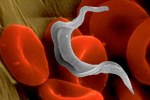Ask a Scientist : “So What’s a Parasite Anyway?”
 “So What’s a Parasite?” was one of a lecture series called, “Ask a Scientist”. The lectures are for “curious humans” and I for one am curious about parasites and other nasties.
“So What’s a Parasite?” was one of a lecture series called, “Ask a Scientist”. The lectures are for “curious humans” and I for one am curious about parasites and other nasties.
I attended the lecture by Dr. Jim McKerrow from the University California San Francisco’s Department of Pathology and Laboratory Medicine on parasites that took place in a toasty warm tent heated by gas lamps at the SF StrEAT Park in the Mission, San Francisco.
Anyway, I just want to share some gross pictures and remind you how the Lord God made all these creatures great and small; very, very small. Some of these creatures are so small that they live in the guts of bugs and some organisms are so small that they burrow into the skin infecting various organs reining havoc on their host by making them extremely sick and sometimes even killing them.
As the audience drank beer and tucked into their Mexican food from the various food trucks in the StrEAT park, Jim started by introducing the dining audience to the parasite responsible for Chagas’ disease. Chagas’ disease is a protozoan that damages the cardiovascular system.The protozoa Trypanosoma cruzi grows in the gut of the bug and is transmitted by the triatomine bug via its feces. The bug bites the skin of its victim and defecates in or near the wound which subsequently irritates the person or animal who then scratches the wound rubbing the feces into the wound even more. T. cruzi makes its way into the bloodstream and hides in the muscular wall of the heart and intestines causing damage.
The parasite can be transmitted across the placenta from the infected mother to her baby. All blood for blood transfusion in the USA is tested for the T. cruzi parasite since many of them remain in the blood stream.
According to the World Health Organization, 7 to 8 million people worldwide are infected with Chagas’ Disease — many of whom are in Latin America.
More bugs to follow… Stay tuned and don’t scratch!
Additional Sources:
WHO Media centre Factsheets
Ask a Scientist website
Dr. Jim McKerrow page at UCSF

Leave a comment